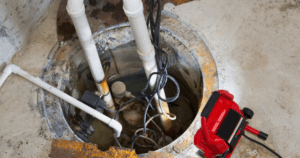Dealing with a blocked sewer line can be a frustrating and inconvenient experience for any homeowner. It can lead to widespread plumbing problems, backups, and potential health hazards. Understanding the causes behind a clogged sewer line is crucial in effectively preventing and addressing this issue. This blog post will explore why sewer lines get clogged and provide insights into prevention and possible solutions.
Importance of Clean Sewer Line
Regular cleaning and maintenance help prevent blockages, backups, costly repairs, unpleasant odors, and health hazards. Here are several reasons why maintaining a clean sewer line is crucial:
Preventing blockages and backups
Regular sewer line cleaning helps prevent blockages from accumulating in the pipes. Blockages can lead to stoppages, causing wastewater to flow back into your home and potentially causing damage to your property and health hazards.
Avoiding costly repairs and replacements
Neglecting sewer line maintenance can result in severe and expensive repairs or a complete line replacement. Over time, debris, grease, and other materials can accumulate in the sewer line, leading to clogs and damage to the pipes.
Preventing odors and health hazards
A clean sewer line helps prevent unpleasant odors from seeping into your home. Blockages and backups can cause foul smells to emanate from drains and fixtures.
Extending the lifespan of the sewer line
Periodic cleaning and maintenance can help develop the lifetime of your sewer line. Removing debris and buildup reduces the strain on the pipes, preventing premature deterioration and potential pipe failures.
Improving plumbing system performance
A clean sewer line ensures efficient wastewater flow from your home to the municipal sewer system or septic tank. It helps maintain proper plumbing system performance, preventing issues such as slow drains, gurgling sounds, and frequent clogs.
Causes of a Clogged Sewer Line
Let’s have a look at the causes of clogged sewer lines now:
Tree Roots
Tree roots are one of the primary culprits behind sewer line clogs, especially in older houses. Tree roots seek moisture and warmth, which can attract them to sewer lines. They infiltrate pipes through small cracks or loose joints and grow inside, causing blockages over time.
Accumulated Debris
The accumulation of debris inside the sewer line can lead to clogs. Household drains may contribute to this issue when items like baby wipes, feminine products, excessive toilet paper, and other non-flushable materials are flushed down the toilet or washed down the drains.
Fats, Oil, and Grease (FOG)
FOG, commonly known as fats, oil, and grease, can thicken and stick to the inner walls of sewer pipes, reducing the flow capacity and potentially causing blockages. Improper disposal of cooking oil and greasy substances down the drain can contribute to sewer line clogs.
Broken or Collapsed Pipes
A broken or collapsed sewer pipe can impede wastewater flow, leading to blockages. It can occur due to aging pipes, shifting soil, ground settlement, or external factors like tree root intrusion.
Signs of a Clogged Sewer Line
The following indicators may suggest a clogged sewer line:
Multiple drain backups: If various drains in your home, such as sinks, tubs, showers, and toilets, are backing up simultaneously, it could be a sign of a clogged sewer line.
Slow drainage: Water draining slowly or not from various fixtures can indicate a sewer line blockage.
Unpleasant odors: Foul odors emanating from drains or sewage backups may suggest a clogged sewer line.
Gurgling sounds: Gurgling sounds from drains when using plumbing fixtures indicate a sewer line issue.
Prevention and Solutions
Here are the preventions & solutions to the frustrating clogged sewer lines:
Proper disposal practices
Avoid flushing non-biodegradable items like wipes, feminine products, and paper towels go down the toilet. Additionally, refrain from pouring grease and oil down the drains, as they can accumulate and lead to clogs.
Regular maintenance
Consider scheduling regular sewer line inspections and cleanings to identify and address potential issues before they become significant problems.
Professional assistance
If you suspect a clogged sewer line, it is advisable to contact a professional plumber. They have the expertise and tools to diagnose the issue accurately and provide appropriate solutions.
Read More: How Does Pipe Corrosion Take Place?
Conclusion
A blocked sewer line can lead to severe inconvenience and potential damage to your home’s plumbing system. Understanding the causes and signs of a clogged sewer line is essential for prevention and timely intervention. By implementing proper disposal practices, regular maintenance, and seeking professional assistance when needed, you can minimize the risk of experiencing a clogged sewer line and ensure the smooth operation of your plumbing system.
Contact RK Plumbing & HVAC Services LLC at (646) 361-5867. Our team has the knowledge and experience to quickly diagnose the problem and suggest the best course of action.







